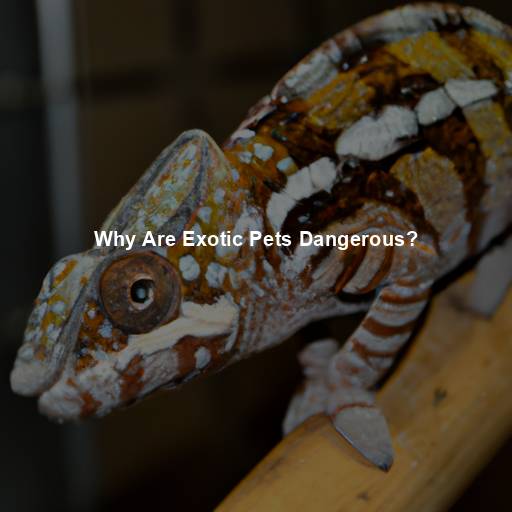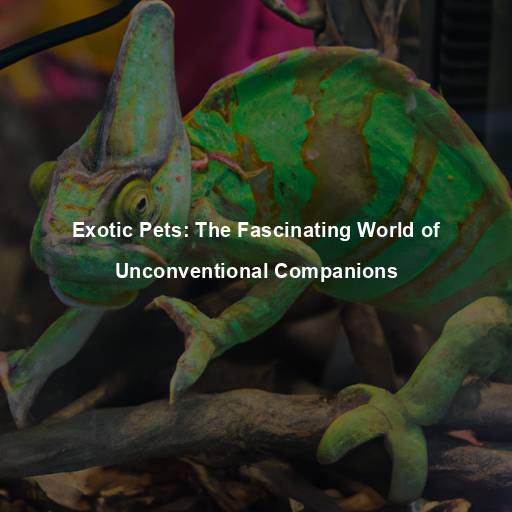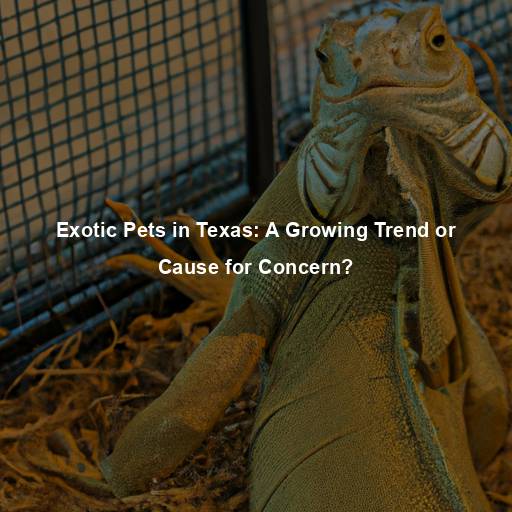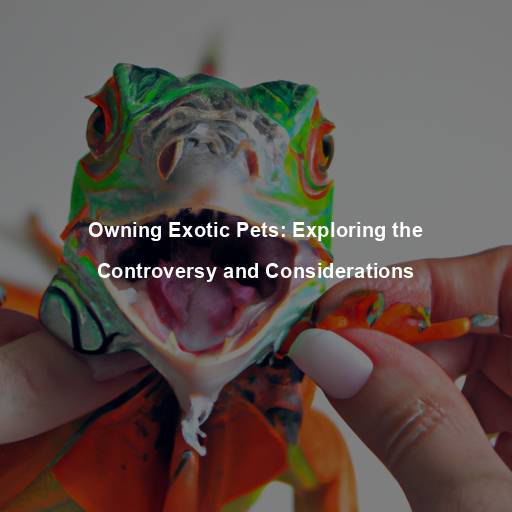Why Are Exotic Pets Dangerous?
Last Updated on July 10, 2023 by Evan
Contents
- 1 Understanding the Appeal of Exotic Pets
- 2 Ethical Concerns Surrounding Exotic Pet Trade
- 3 Legal and Regulatory Considerations
- 4 The Emotional Toll on Exotic Pets
- 5 Public Safety Concerns
- 6 Responsible Pet Ownership: Choosing the Right Companion
- 7 FAQs: Why Are Exotic Pets Dangerous?
- 7.1 What are exotic pets?
- 7.2 Why are exotic pets dangerous?
- 7.3 Are exotic pets more likely to attack their owners?
- 7.4 Can exotic pets escape and pose a threat to the environment?
- 7.5 Are there legal and ethical concerns surrounding exotic pet ownership?
- 7.6 How can we minimize the risks associated with exotic pets?
Understanding the Appeal of Exotic Pets
Throughout history, humans have been lured by the enchantment of exotic pets. From the majestic elegance of big cats to the mesmerizing beauty of colorful reptiles, these extraordinary creatures have always possessed a captivating charm that tempts people to make them companions in their homes. The inclination to possess such rare animals emerges from a deep longing for a taste of the extraordinary, an innate desire to connect with the untamed, or simply the allure of owning something exceptionally unique. However, amidst the thrill and allure, it is crucial to acknowledge the inherent hazards and uncertainties that accompany the choice to indulge in an exotic pet ownership journey.
The Dark Side of Exotic Pet Ownership
Exotic pets, with their mesmerizing allure and stunning aesthetics, undeniably catch our attention. Yet, it is essential to grapple with the undeniable truth that these creatures are not meant for the confines of our homes. Their evolutionary journey has molded them into creatures of the wild, making it imperative for us to recognize that locking them away curtails their innate desires and essential requirements. The repercussions of confining these magnificent beings can manifest in physical and psychological turmoil, imposing grave risks on both the animal and its caretaker.
Health Risks and Zoonotic Diseases
One of the most significant concerns when it comes to exotic pets is the potential risk to public health. Many exotic animals carry zoonotic diseases, which are infectious diseases that can be transmitted between animals and humans. These diseases can range from mild infections to severe illnesses that may even be life-threatening. Exotic pets, such as reptiles and primates, are known carriers of diseases like salmonella, herpes B, and monkeypox.
Unpredictability and Aggression
Another inherent danger associated with exotic pets is their unpredictable nature and potential for aggression. These animals are not domesticated like traditional pets, which have been bred for generations to live harmoniously alongside humans. Exotic pets retain their wild instincts, making it challenging to predict their behavior accurately. Even seemingly docile creatures can exhibit sudden aggression or display territorial tendencies, which can result in severe injuries or even fatalities.
Specialized Care and Dietary Needs
Keeping exotic pets can be an enticing idea, but it comes with a multitude of perplexing challenges. These extraordinary creatures have intricate demands when it comes to their diet and habitat. Take, for instance, reptiles that necessitate specific temperature and humidity levels, or big cats that require generous areas in order to roam freely and exercise. Neglecting these crucial needs can have detrimental effects on the animal’s overall health and happiness.
Ethical Concerns Surrounding Exotic Pet Trade
In our ever-shrinking world, the allure of owning an exotic pet may be hard to resist. But let’s pause for a moment and peel back the layers of this seemingly enchanting phenomenon. What lies beneath the surface is a tangled web of perplexity and ethical quandaries. Beyond the immediate perils of keeping such creatures as pets, there exists a broader and more disconcerting issue: the rampant exotic pet trade.
Responsible Alternatives to Exotic Pet Ownership
As we navigate the fascinating world of extraordinary pets, it becomes evident that responsible choices are paramount. Amidst this perplexing task, the welfare of these awe-inspiring creatures and the urgent need for conservation cannot be overlooked. Rather than succumbing to the allure of bringing wild beings into our abodes, let us embrace the alternatives that champion animal welfare and safeguard their natural habitats. From supporting organizations and sanctuaries committed to rehabilitation and protection, to immersing ourselves in wildlife reserves or dedicating our time at animal shelters, let us cherish the enigmatic beauty of exotic wildlife while ensuring their well-being.
Education and Awareness
In a world where the allure of owning exotic pets is on the rise, it becomes imperative to unravel the intricate web of dangers and ethical quandaries that lie beneath the surface. By cultivating a sense of awareness, we can uplift the consciousness of those enthralled by the enigmatic charm of these animals, ultimately diminishing the demand for their ownership. Through the dissemination of knowledge and dispelling the fog of myths and misconceptions, we can pave the way for a more enlightened society that cherishes the welfare of all creatures, be they wild or domestic. Let us embark on this transformative journey by nurturing responsible pet ownership and kindling the flames of conservation, igniting a collective empathy that resonates through the very essence of humanity.
Invasive Species and Habitat Destruction
The allure of owning exotic pets comes with a dark side that often goes unnoticed – the perilous risk of introducing invasive species into our delicate ecosystems. When these exotic creatures escape or are set free in the wild, the consequences can be catastrophic, wreaking havoc on native wildlife and their habitats. In a fierce battle for resources, invasive species often triumph over their homegrown counterparts, throwing the delicate balance of our ecosystems into disarray. With the introduction of non-native flora and fauna, we face a looming threat of biodiversity loss and a shattered food chain, casting a perplexing shadow over our environmental future.
Irresponsible Release and Abandonment
Unfortunately, some owners may realize the challenges of caring for exotic pets and make the ill-informed decision to release or abandon them. This irresponsible act not only endangers the welfare of the animal but also poses risks to local wildlife and ecosystems. Exotic pets that are not adapted to the local environment may struggle to survive, potentially spreading diseases or preying upon native species. The release of exotic pets can have far-reaching consequences and represents a significant threat to the delicate balance of our ecosystems.
Legal and Regulatory Considerations
Restricted and Illegal Ownership
The ownership of exotic pets is regulated by laws and regulations that vary from country to country and even within different regions. Many jurisdictions have restrictions on owning certain species, particularly those classified as endangered or posing a risk to public safety. However, enforcement of these laws can be challenging, and the demand for exotic pets continues to fuel the illegal wildlife trade. It is essential for prospective owners to thoroughly research and understand the legal requirements and potential consequences before considering exotic pet ownership.
Licensing and Permitting
In the intriguing world of exotic pet ownership, a journey into the realm of licenses and permits awaits those venturing into this extraordinary territory. These enigmatic measures are in place to guarantee that potential caretakers possess the essential know-how, resources, and capability to offer the most fitting care for these one-of-a-kind creatures. Through an intricate web of assessments, authorities delve into the enigmatic realm of an owner’s expertise, the suitability of their facilities, and their capacity to meet the elusive needs of these exotic companions. These enigmatic regulations ultimately serve as an enigmatic shield, protecting both the captivating creatures and an intrigued public.
The Emotional Toll on Exotic Pets
Psychological Distress and Behavioral Issues
Exotic animals, known for their remarkable intelligence and intricate social dynamics, possess a web of needs that are often left unfulfilled when held captive. Removed from their native environments and isolated from their familiar tribes, these creatures endure an enigmatic and disorienting existence. The void of mental stimulation, coupled with the confinements of limited space and the inability to embrace their innate instincts, can incite a profound sense of frustration, melancholy, and the manifestation of perplexing aberrations. From self-inflicted wounds to repetitive movements and unwarranted outbursts, these telltale signs of psychological anguish not only signify the animals’ torment but also pose a perplexing conundrum for their caretakers, jeopardizing the very fabric of their safety.
Lifelong Captivity and Restricted Freedom
There’s a perplexing paradox to the allure of exotic animals as pets. While they possess an awe-inspiring beauty, their true essence lies in their ability to roam wild, undertaking epic journeys and engaging in instinctual behaviors. However, once confined to domesticity, these creatures become victims of the very captivity they’re thrust into. Their natural environment snatched away, they are left with a bleak existence, devoid of fulfillment and the vibrancy that defines their existence.
Public Safety Concerns
Escapes and Attacks
There’s an undeniable allure to owning exotic pets with their vibrant colors and captivating behaviors. However, it’s crucial to recognize the flip side of the coin – the stunning escapades these creatures are capable of. Their knack for cunningly slipping out of their enclosures adds a peculiar sense of unpredictability to the mix. While it may seem thrilling to have a unique companion, it’s crucial to understand the latent dangers that come hand in hand.
Lack of Proper Emergency Response
Dealing with emergencies involving exotic pets can be challenging for both owners and emergency responders. Local authorities may not have the necessary training or equipment to handle situations involving dangerous exotic animals. This lack of preparedness can result in delays in responding to emergencies, increasing the potential for harm to both humans and animals. Additionally, the exotic nature of these pets can lead to misunderstandings and misconceptions, further complicating emergency responses.
Responsible Pet Ownership: Choosing the Right Companion
Considerations for Prospective Pet Owners
When considering bringing a pet into our lives, it is crucial to prioritize the well-being of the animal and our ability to meet its physical, emotional, and environmental needs. Responsible pet ownership entails thorough research, realistic assessment of our capabilities, and a commitment to providing a loving and suitable home for the chosen companion. Traditional pets, such as dogs and cats, have been domesticated over centuries and are well-suited for life alongside humans. They offer companionship, loyalty, and the opportunity for a deep bond while being more compatible with our domestic environments.
Fostering a Culture of Conservation
By fostering a culture that values the conservation of wildlife and their natural habitats, we can promote responsible attitudes towards pet ownership. Encouraging education and awareness about the dangers and ethical implications of owning exotic pets can help shift societal norms and reduce the demand for these animals. Supporting organizations and initiatives that work towards wildlife conservation can also contribute to the preservation of our planet’s biodiversity and the well-being of animals in their natural habitats.
FAQs: Why Are Exotic Pets Dangerous?
What are exotic pets?
Exotic pets refer to non-traditional animals that are commonly kept as pets, but are not typically found in households. These can include reptiles, amphibians, birds, small mammals, and even certain wild animals. While some people may find the idea of owning an exotic pet intriguing or exciting, it is important to consider the potential dangers associated with keeping these animals as pets.
Why are exotic pets dangerous?
Exotic pets can pose significant dangers both to their owners and to the general public. One of the main concerns is the risk of physical harm or injury. Many exotic pets have specialized needs, unique behaviors, and natural instincts that can become a threat to humans. For example, large reptiles or primates may have the strength to cause serious injuries or even fatalities. Moreover, exotic pets can carry diseases, parasites, or harmful bacteria that can be transmitted to humans and other animals, increasing the risk of infection or illness.
Are exotic pets more likely to attack their owners?
Not all exotic pets are flat-out aggressive or seeking havoc, but it’s important to realize that they have unique requirements. Neglecting those needs may trigger unexpected bouts of hostility. The enigmatic nature of these creatures, their deep-rooted instincts, and social interactions that are often misconstrued can up the ante for attacks on their owners and unsuspecting victims. The absence of adequate training, socializing, and competent handling expertise can escalate the likelihood of aggression and hazardous conduct.
Can exotic pets escape and pose a threat to the environment?
Yes, exotic pets escaping from their enclosures pose a serious threat to the environment. If exotic species are released into non-native habitats, they can disrupt local ecosystems and harm native animal populations. For instance, certain reptiles or amphibians can become invasive species, outcompeting indigenous animals for resources and potentially causing irreparable damage to local biodiversity. The release of pets like snakes, for example, can lead to imbalances in predator-prey relationships and ecological disturbances.
Are there legal and ethical concerns surrounding exotic pet ownership?
Owning an exotic pet can be a real jungle of intricacies and dilemmas. The legal landscape surrounding these captivating creatures is as diverse as the vibrant colors of their feathers and scales. From country to country, and even within regions, regulations swing like a pendulum, leaving pet enthusiasts tangled in a web of uncertainty. The shadowy world of illegal acquisition further muddies the waters, perpetuating the illicit trade and putting vulnerable species at risk. And while the allure of sharing our lives with extraordinary animals is clear, the ethical quandaries arise when we confront the harsh reality of confining them in cramped spaces, far from their natural homes.
How can we minimize the risks associated with exotic pets?
Minimizing the risks associated with exotic pet ownership involves several important steps. Firstly, research should be conducted to fully understand the specific needs, behaviors, and requirements of the desired exotic pet. It is essential to be aware of the potential dangers associated with the species being considered and to make an informed decision. Secondly, seeking guidance from professionals, such as veterinarians or experienced exotic pet owners, can provide valuable advice on proper care, handling, and safety measures. Lastly, supporting initiatives that promote the conservation of wild animals and discourage the illegal wildlife trade can help protect both exotics in their natural habitats and potential owners alike.







